
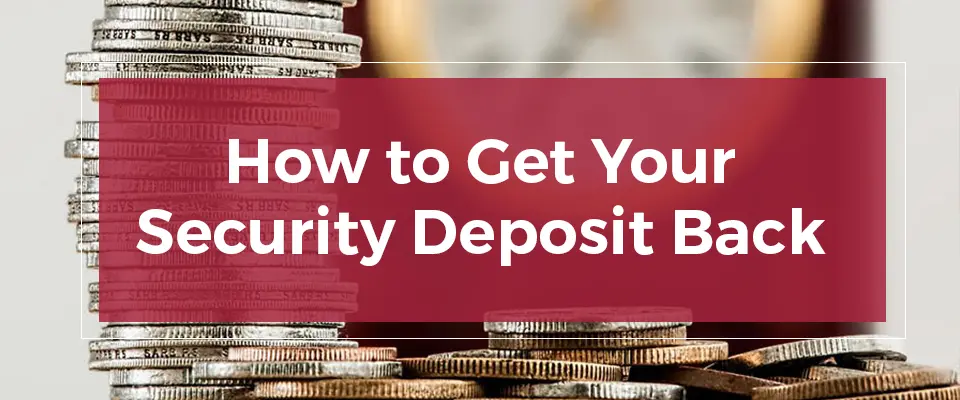
When you rent an apartment, it’s common for a landlord or management company to charge you a security deposit, in addition to your monthly rent and other fees. Although the rules about security deposits are different from state to state, you can expect to get some or all of your deposit back when you move out.
If you’re renting in Pennsylvania, for example, your landlord can have you put down a deposit of up to two months worth of rent during your first year in a home. If you remain in an apartment for more than a year, the landlord can only collect one month’s worth of rent as a deposit. The landlord needs to deposit the money into an interest-bearing savings account for as long as you live in the home. It gets better — if you’re in an apartment for more than two years, PA law states that you need to be paid the interest earned on the deposit starting in the 25th month you’re in the same apartment.
If all goes well, you’ll get your security deposit back when you move out of the apartment. There are a few reasons why a landlord might be able to keep some or all of your deposit, though. Whether this is your first time renting or not, it’s important to understand what you can do before you move, while living in a place and when you’re ready to move out to increase your chances of getting the full deposit back.
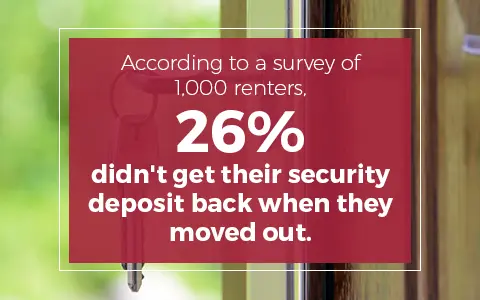 According to a survey of 1,000 renters, 26 percent didn’t get their security deposit back when they moved out. For the most part, landlords want to give you back your security deposit. In PA at least, they don’t get to pocket the money and treat it as their own. The deposit belongs to you — which is why you get to collect interest on it after two years. But you can forfeit some or all of the deposit if you don’t follow the terms of your lease to the letter.
According to a survey of 1,000 renters, 26 percent didn’t get their security deposit back when they moved out. For the most part, landlords want to give you back your security deposit. In PA at least, they don’t get to pocket the money and treat it as their own. The deposit belongs to you — which is why you get to collect interest on it after two years. But you can forfeit some or all of the deposit if you don’t follow the terms of your lease to the letter.
If you break the lease or cause significant damage to the apartment you’re living in, that’s more of a hassle for the landlord. They end up using the funds to cover the cost of any damage you caused or to make up the difference in lost rent.
The survey results showed that many of the renters who didn’t get their security deposits back were given some reason why. For example, 44 percent of renters in the 18 to 24 age bracket surveyed didn’t get their deposits back because they broke the terms of their leases. Nine percent of female renters lost some or all of their deposits because of damage caused by their pets.

Interestingly enough, the survey found that 36 percent of renters weren’t given a reason for not getting their deposits back. If that happens to you, you do have a right to ask your landlord why you didn’t get your money back or take further action. In PA, your landlord needs to provide you with a list of damages and the cost to repair them if they don’t refund your entire deposit.
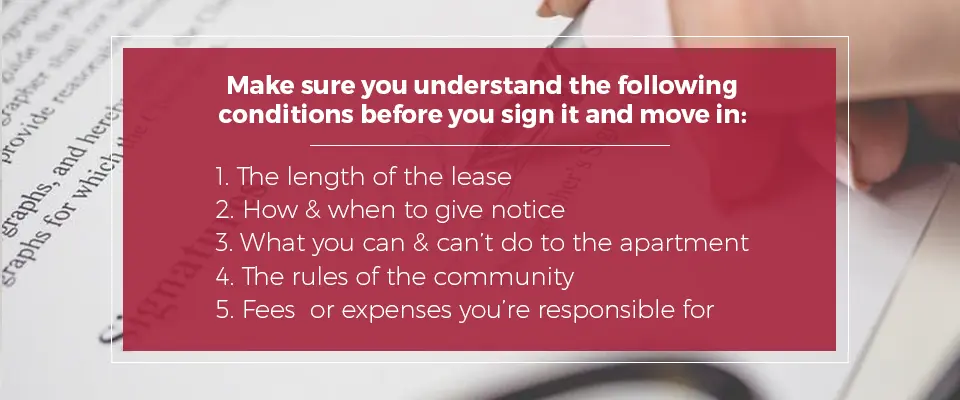
There are two things you can do before you move into a home or apartment that will help increase the likelihood you will get your security deposit back. Step one is to read your lease and make sure you fully understand what it says.
Many leases contain terms that will influence whether or not you will get your deposit back when you move out. Make sure you understand the following conditions before you sign it and move in:
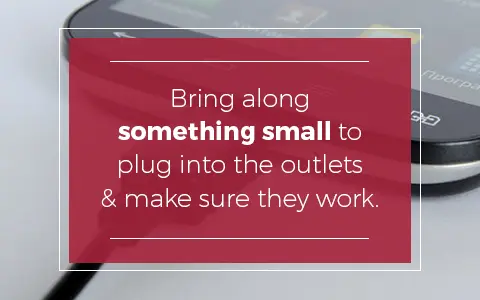 When you move out of your apartment, you don’t want your security deposit to go toward damages caused by the previous tenant or wear and tear that was in the space before you moved in. It’s a good idea to do a walk-through of the apartment, either with or without the landlord, a day or so before you move in.
When you move out of your apartment, you don’t want your security deposit to go toward damages caused by the previous tenant or wear and tear that was in the space before you moved in. It’s a good idea to do a walk-through of the apartment, either with or without the landlord, a day or so before you move in.
Your landlord might give you a form that allows you to list potential damage in each room. If you don’t get a form, you can make one yourself. Simply list each room and note any issues. Taking pictures of any pre-existing damage can help you make your case if you do get charged when you move out. Here’s a list of things to look out for when you do the walk-through:
How well you take care of the apartment (or not) while you live there will have a big effect on whether or not you are able to get your security deposit back when you move. Although some wear and tear is to be expected during the months and years you live in the apartment, your landlord can deduct the cost of major, unreported damage when you move out. Here are five ways to protect your apartment — and your security deposit:
On move-in day, you’ll be lugging heavy boxes and carrying big pieces of furniture. There’s a risk for some damage occuring on that day, so it’s very important to be extra careful.
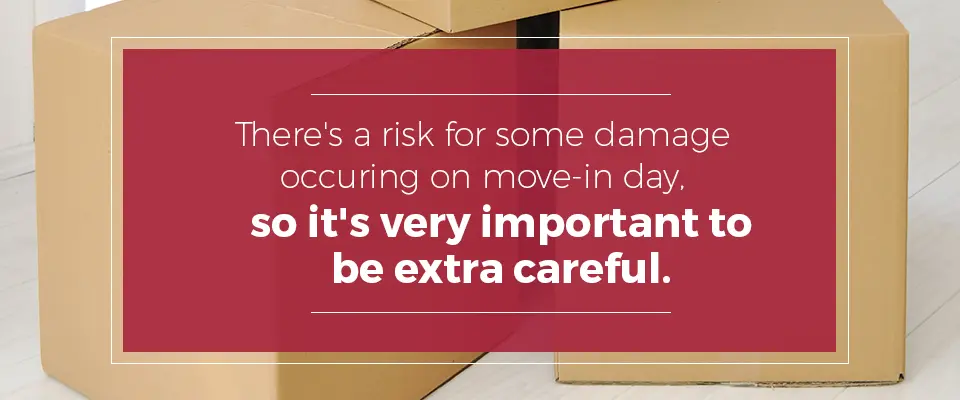
If a couch or table is too heavy for you to lift, don’t drag it across the floor. You’ll risk not only breaking the furniture, but permanently scratching the floor. Get a friend to help you carry the heavy items, or better yet, hire movers to do the heavy lifting.
You want to put your personal stamp on your apartment, but you also want to get your deposit back. Think carefully before pounding nails into the wall or hanging up any shelves. You don’t want the shelf or a heavy picture frame to fall down, tearing out half of the drywall with it.
Remember to confirm with your landlord or leasing company and to check the lease before making any semi-permanent changes to your apartment. It might be OK for you to paint the walls then paint them back before you move, but you need to be sure you have the landlord’s approval first.
Stains, spills and other messes are easier to clean up right after they happen, rather than months or years later. Cleaning may be a bore, but your wallet will thank you later when you get your deposit back instead of having some of it go toward deep cleaning your apartment after you move out.
Things happen — appliances break, carpets get stained, plumbing goes haywire. If and when problems come up in the apartment, tell the leasing company or landlord right away, especially if the damages aren’t your fault. Your landlord has a responsibility to fix things in the apartment, based on the lease and the rules of your state. The sooner an issue gets fixed, the more livable your apartment will be.

If you do break something or damage something yourself, it might be a good idea to notify the landlord or leasing company and to cover the cost of repairs out of your own pocket. Although you’ll still be responsible for the damage, it’s usually cheaper to pay for it yourself rather than have the amount deducted from your deposit at move-out time.
Landlords are people, too, and they might be more likely to cut a break to tenants with whom they have a good working relationship. Pay your rent on time and generally keep the landlord or leasing company in the loop about what’s going on in the apartment.
It’s also a good idea to follow the rules of your apartment community and to generally be a respectful neighbor. Don’t be the apartment that’s having parties until 3 am or the apartment that puts its trash out too early, for example.
How you act when it’s time to move to another home will have an effect on how much of your deposit you get back. First things first, make sure you give the landlord notice that you’re moving, within the time frame stated in your lease. Whether you need to give 30 or 60 days’ notice, it’s best to do it in writing, so there is some documentation of the notice.
When you give notice, provide the landlord with a forwarding address so they know where to send the security deposit. If you don’t know where you’re moving next, provide the address of a family member or friend.
Before you move out, fix up any small issues with the apartment and fill in any nail holes you put in the wall. Deep clean the rugs to remove any stains and to restore their condition as much as possible.
As you pack up your apartment, make decisions about where your belongings will go. If you don’t want something anymore, don’t just leave it behind, as your landlord can charge you for leaving items in the home. Be sure to donate or discard any items you aren’t bringing with you.
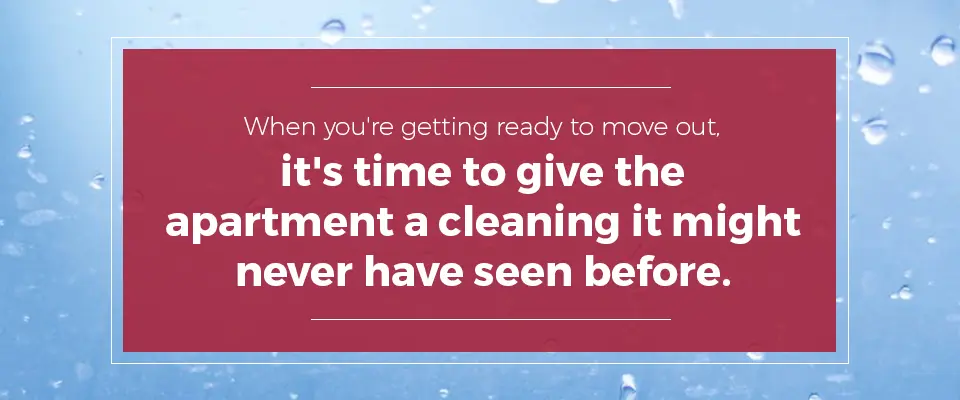
When you’re getting ready to move out, it’s time to give the apartment a cleaning it might never have seen before. You don’t just want to dust and vacuum. You want to return the apartment in the cleanest condition it’s ever been in. Depending on your tolerance for housework, it might be in your best interest to hire a house cleaning service to tidy up and deep clean the apartment once you’ve packed up and loaded out all of your belongings.
Your stuff is loaded onto the truck. The apartment is clean as a whistle, and you’re ready to move on. That’s it, right? Not so fast! Before you say goodbye to your old home for good, you want to check in with the leasing company or landlord to make sure you’re all on the same page.
Just as you did a walk-through before you moved in, it’s important to do a walk-through after you’ve moved out. Go through the apartment with the landlord and review the original checklist you made.
In a perfect world, you and the landlord will only notice the damage that was noted during the original walk-through or won’t notice any damage at all. More likely, there will be some damage to the apartment or some signs of wear and tear.
This is the time to negotiate. Your landlord might give you an estimate of the cost of any damages. You might have the option of offering to pay for repairs out of your own pocket, potentially lowering the cost, or you can agree to have the repairs deducted from your security deposit.
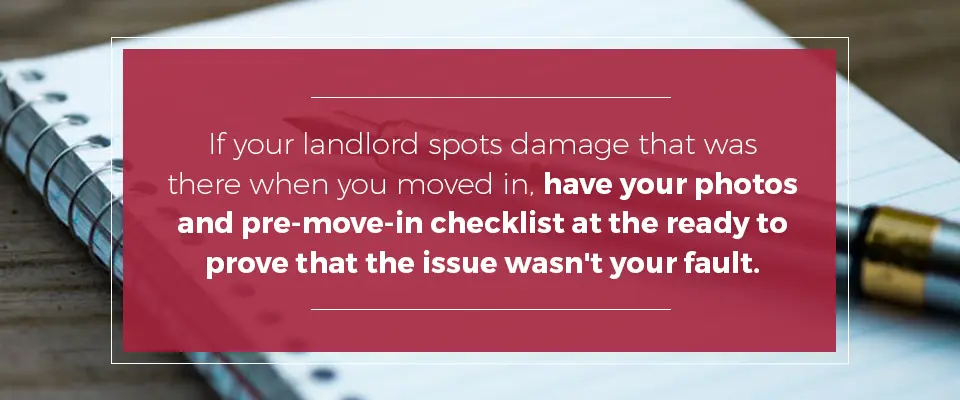
If your landlord spots damage that was there when you moved in, have your photos and pre-move-in checklist at the ready to prove that the issue wasn’t your fault.
Once the walk-through is over, make sure you have the updated list of damages and the estimated cost of repair. That way, you can compare the estimated amount to the amount you end up being charged or can use the estimate as a guideline when you make arrangements for fixing the damage.
After the walk-through, don’t forget to give your landlord or the leasing company the keys to the apartment. Your landlord can deduct the cost of replacement keys from your deposit if you fail to return all or some of them. If you know that you’re going to get the full amount of the deposit back, it can be in your best interest to schedule a final meeting with your landlord to return the keys in exchange for your security deposit check.
How long does it take to get your security deposit back? It varies from state to state, but 30 days is usually the maximum time a landlord has to return the deposit. In PA, your landlord needs to give you the full deposit back within 30 days or provide you with a list of damages and the cost of repair, plus any remaining deposit amount, within that time frame.
It’s up to you to be proactive about getting your deposit back. You need to specifically request it, or else the landlord is within their rights not to return it. Don’t just expect that a check will show up in the mail one day, especially if you didn’t give your landlord a forwarding address and never really discussed the matter with them.
What are your options if your landlord doesn’t give you the deposit back within 30 days or doesn’t provide reasons for not returning it? You can do two things. First, you can politely ask for the deposit back. People make mistakes, and returning your money might have just slipped the landlord’s mind.
If that doesn’t work, you have the option of filing a claim in small claims court. The court will most likely rule in your favor if the landlord is unable to provide proof or reasons for keeping the money.
You can hope things don’t reach that point, though. Working with an established leasing company, showing care and respect for your home and being proactive throughout the process can help you get your deposit back, in full, in a timely fashion.

Are you ready to move into a new apartment? Contact Triple Crown Corporation to learn more about the homes we have for rent. You can also read the rest of our blog to find useful information on moving into and living in an apartment.